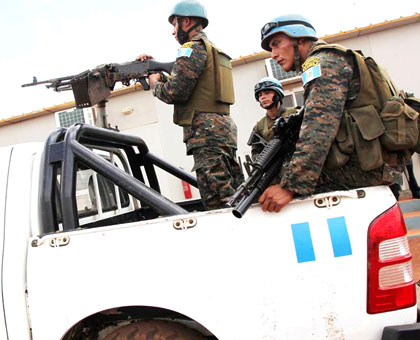Two members of a UN panel monitoring a sanctions regime against the DR Congo have been replaced, more than a year after Rwanda questioned their neutrality.


Two members of a UN panel monitoring a sanctions regime against the DR Congo have been replaced, more than a year after Rwanda questioned their neutrality.
They are Belgian Bernard Leloup and Marie Plamadiala, from Moldova.
Leloup was in charge of regional issues on the UN Group of Experts on the DR Congo, while Plamadiala specialised in armed groups.
The decision to drop the duo came this week as the UN Security Council named a new DR Congo sanctions panel for the next one year.
The new team, including three Africans, is headed by American Daniel Fahey, who will also be in charge of finance. Victry Anya, from Nigeria, takes over as regional expert, Zobel Behalal (Cameroon) is in charge of the natural resources docket, while Gora Mbaye (Senegal) takes over customs/aviation.
The other members include arms expert Frans Barnard (UK) and Emilie Serralta, from France, who will focus on armed groups. Their term ends February 1, 2015.
The previous group, which had Serralta as coordinator, also included Nelson Alusala (Kenya), Henry Fomba, (Cameroon), and Fahey.
The Group of Experts on DR Congo is charged with monitoring the implementation or violation of the existing UN arms embargo and related sanctions imposed on DR Congo territory.
Previous panels of UN experts on the DR Congo published highly contentious reports on the recurrent crises in the neighbouring country, often suggesting that Kigali was a destabilising factor.
In protest, Rwanda – now serving its second year on the Security Council –challenged the neutrality of some of the members, particularly those with a background of hostility toward Kigali and consistent sympathies for Rwandan government opponents, including DR Congo-based FDLR outfit, the militia largely blamed for the 1994 Genocide against the Tutsi.
"The list was circulated to the UN Security Council on February 26 prior to their official nomination. The Council members, including Rwanda, had no objection to the appointments,” Chantal Uwizera, the press attaché at Rwanda’s Permanent Mission to the UN, told The New Times.
Working in good faith
She added: "We pledge to work with all the members in good faith, and, in return, hope that they abide by their methods of work and conduct investigations with impartiality.”
In 2012, Rwanda officially objected to the UN on the candidature of Leloup and Plamadiala.
It cited several cases that brought the duo’s objectivity into disrepute, as well as qualification, especially on the part of the Moldovan, who did not "meet the professional requirements for an independent expert”.
Examples of Leloup’s bias put forward by Rwanda included his June 2003 opinion article titled, "Time to Turn the Heat on President Kagame,” in which he argued; "Since RPF’s ascension to power in 1994, the regime has not ceased to harden, particularly during the last few years. Repression has reached great heights, as political instability has increased across the country and within the army.”
It is not the first time that the group is riddled with controversy.
Serralta’s successor, American Steven Hege, had, in his publications prior to taking up the sanctions monitoring role, cut the appearance of an apologist of the perpetrators of the 1994 Genocide against the Tutsi.
In several articles, he questioned the legitimacy of the post-Genocide government suggesting that it was made up of foreign occupiers.
Both Plamadiala and Alusala were members of the Hege’s team.


